The Common Progression Problem
I have 2
arithmetic progressions
:
{
1
6
,
2
1
,
2
6
,
3
1
,
…
2
1
,
2
5
,
2
9
,
3
3
,
…
The number 21 appears in both of these progressions.
There are also other numbers that appear in both of these 2 progressions!
What is the sum of the first 100 common terms of these 2 progressions?
The answer is 101100.
This section requires Javascript.
You are seeing this because something didn't load right. We suggest you, (a) try
refreshing the page, (b) enabling javascript if it is disabled on your browser and,
finally, (c)
loading the
non-javascript version of this page
. We're sorry about the hassle.
3 solutions
@Peter van der Linden - can we arrive at the conclusion that the common difference of the new series will be the LCM of the common differences of the given series?
Log in to reply
Well, generally, yes, except if the given series has no common terms.
The terms common to them are 2 1 , 4 1 , 6 1 , 8 1 . . . . Notice that it forms an Arithmetic Progression with a common difference of 2 0 . Finding the sum of the first 1 0 0 common to them, we have
s = 2 n [ 2 a 1 + ( n − 1 ) d ] = 5 0 [ 4 2 + ( 9 9 ) ( 2 0 ) ] = 1 0 1 1 0 0

Relevant wiki: Arithmetic Progression Sum
By writing out more terms for each of these sequences of numbers, we noticed that the numbers that are in common are
2 1 , 4 1 , 6 1 , …
Since the terms that are in both sequences have a difference of 20, we get a new sequence with the direct formula: u n = 2 0 n + 2 1 .
Using the formula for the arithmetic progression, we have the sum of the first n terms of an arithmetic progression, S n ,
S n = 2 n [ 2 a + ( n − 1 ) d ] ,
where a = 2 1 is the first term, d = 2 0 is the common difference. n = 1 0 0 . Substituting these numbers gives the desired answer of
S 1 0 0 = 2 1 0 0 [ 2 1 + ( 1 0 0 − 1 ) ( 2 2 ) ] = 1 0 1 , 1 0 0 .